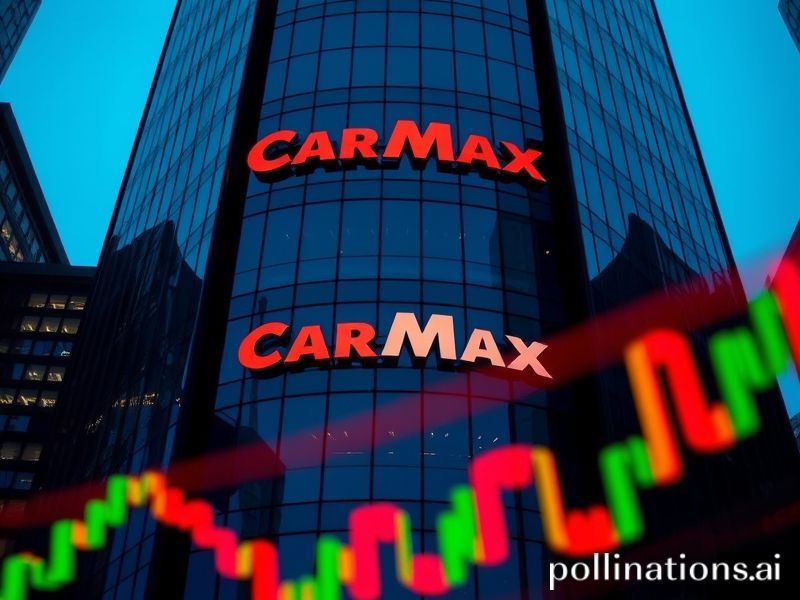CarMax Stock: Why a Used-Car Lot in Virginia Is Now the Planet’s Mood Ring
CarMax Stock: The Used-Car Bazaar That Became a Global Mood Ring
By our man in the departure lounge, still waiting for the parts supply chain to catch up with his optimism
If you want a pulse check on the planet’s emotional stability, skip the WHO dashboards and head straight to KMX on the New York Stock Exchange. While diplomats argue over whose underwater territory is whose, CarMax—America’s largest dealer of pre-loved automobiles—quietly tabulates how many ex-rental Nissan Versas humanity is willing to finance at 9.9 % APR. The numbers, dear reader, are a geopolitical Rorschach test with floor mats.
Last quarter the Richmond, Virginia-based conglomerate missed earnings by 54 cents, sending the stock skidding faster than a Lada on black ice. Analysts blamed “macro headwinds,” which is finance-speak for “everyone’s terrified and broke.” Yet from Kiev to Kuala Lumpur the disappointment felt eerily synchronized. Ukrainian delivery drivers who once flipped Polish-market Golfs now patrol bomb-scarred streets in them; Malaysian ride-hailers can’t renew loans because the Ringgit is having an existential crisis. A miss in Virginia reverberates as a migraine in Vilnius—proof that globalization works beautifully when it comes to spreading panic.
Inventory glut is the fashionable horror story. CarMax lots currently hold 105 days of supply, roughly the half-life of a TikTok trend. In the Northern Hemisphere that translates to rows of 2021 Silverados baking under the same CO₂ they helped emit, their resale value dropping faster than a crypto exchange in Montenegro. In the Southern Hemisphere the mirror image appears: Santiago dealers can’t move Chinese EVs because lithium prices—Chile’s birthright—have gone lunar, making new cars cost more than the average copper miner’s annual wage. Result: used-CarMax imports from Houston arrive in Valparaíso like flotsam from a wealthier, dumber civilization.
Central bankers, those fun-loving catastrophists, watch CarMax the way ornithologists watch canaries. When the average American monthly payment hit $734—higher than the GDP per capita of 47 nations—the Federal Reserve finally considered pausing its rate-hike cosplay. Meanwhile the European Central Bank, never one to miss a chance to do too little too late, scribbled “monitor second-hand car inflation” on a Post-it note and promptly went on holiday. In Turkey, where 70 % financing is considered charmingly restrained, citizens shrug and buy whatever still runs on cheap Azerbaijani petrol. A CarMax pricing algorithm has become the most honest central banker alive, which says something depressing about every other central banker.
Of course, the true international subplot is debt. Each CarMax sale is a securitized promissory note sloshing through global pension funds hungry for yield. Your retired Greek civil servant unwittingly owns a tranche of subprime Tacoma loans originated in Phoenix; if Floridian tow-truck repo rates spike, yiayia’s seaside villa gets smaller. Financial engineers call this diversification; the rest of us call it passing the hot potato until the planet burns its fingers.
Environmentalists join the pity party by pointing out that every used car sold is, technically, recycling—except the plastic in a 2019 Jeep will outlast the Pyramids. Climate diplomats in Dubai can negotiate methane caps until their bespoke thawbs wrinkle, but a 2 % dip in CarMax gross margin moves more metal than any treaty.
So what next? If China’s export machine unleashes cut-rate EVs on the world, CarMax could pivot to “pre-owned electrons,” though range anxiety translates poorly across borders. If recession deepens, the company may simply become a parking lot for civilization’s midlife crisis—an automotive museum where admission is 72 monthly payments and exit is bankruptcy.
Either way, watch the ticker. KMX is not just a stock; it’s a planetary diary written in depreciation schedules. And right now the diary reads: “Borrowed too much, drove too far, still stuck in traffic.” Buckle up, Earth—your credit score is in the glovebox, and the repo man cometh with a passport.







